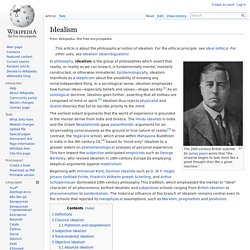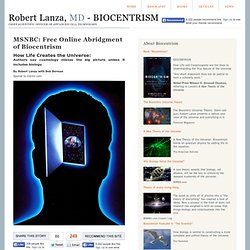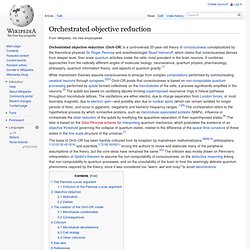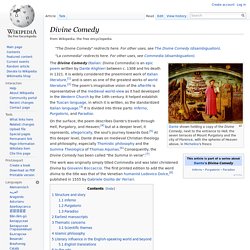

Idealism. The 20th-century British scientist Sir James Jeans wrote that "the Universe begins to look more like a great thought than like a great machine.

" Beginning with Immanuel Kant, German idealists such as G. W. F. Hegel, Johann Gottlieb Fichte, Friedrich Wilhelm Joseph Schelling, and Arthur Schopenhauer dominated 19th-century philosophy. This tradition, which emphasized the mental or "ideal" character of all phenomena, birthed idealistic and subjectivist schools ranging from British idealism to phenomenalism to existentialism.
Definitions[edit] Any philosophy that assigns crucial importance to the ideal or spiritual realm in its account of human existence may be termed "idealist". Subjective idealists like George Berkeley are anti-realists in terms of a mind-independent world, whereas transcendental idealists like Immanuel Kant are strong skeptics of such a world, affirming epistemological and not metaphysical idealism. Classical idealism[edit] Platonism and neoplatonism[edit] therefore;
Robert Lanza, M.D. – BIOCENTRISM » MSNBC: Free Online Abridgment of Biocentrism. Where is the universe?

And exactly where is that fridge? Where is the universe even located? Start with everything that is currently being perceived — the page you are looking at, for example. Language and custom say that it all lies outside us in the external world. Yet we’ve already seen that nothing can be perceived that is not already interacting with our consciousness. If you try to consciously access that luminous, energy-filled, visual part of the brain, it’s easy. Some may imagine that there are two worlds, one “out there” and a separate one inside the skull.
A major handicap in adopting this new viewpoint is that language was created to work exclusively through symbolism, and to divide nature into parts and actions. Orchestrated objective reduction. Orchestrated objective reduction (Orch-OR) is a controversial 20-year-old theory of consciousness conceptualized by the theoretical physicist Sir Roger Penrose and anesthesiologist Stuart Hameroff, which claims that consciousness derives from deeper level, finer scale quantum activities inside the cells, most prevalent in the brain neurons.

It combines approaches from the radically different angles of molecular biology, neuroscience, quantum physics, pharmacology, philosophy, quantum information theory, and aspects of quantum gravity.[1] The Penrose–Lucas argument[edit] The Penrose–Lucas argument states that, because humans are capable of knowing the truth of Gödel-unprovable statements, human thought is necessarily non-computable.[23] In 1931, mathematician and logician Kurt Gödel proved that any effectively generated theory capable of proving basic arithmetic cannot be both consistent and complete. Criticism of the Penrose–Lucas argument[edit] Objective reduction[edit] The Future of Consciousness: Stuart Hameroff at TEDxTucson.
Bohm Consciousness Seminar - Part 1. Joseph Campbell - The Hero's Journey Watch & Download MP4 Online – vDownload.eu. Joseph Campbell interview. Joseph Campbell ~ The Message of Myth. Human Nature talk with Robert Sapolsky, Gabor Mate, James Gilligan, Richard Wilkinson. Conversation with Professor David Bohm. Divine Comedy. Dante shown holding a copy of the Divine Comedy, next to the entrance to Hell, the seven terraces of Mount Purgatory and the city of Florence, with the spheres of Heaven above, in Michelino's fresco On the surface, the poem describes Dante's travels through Hell, Purgatory, and Heaven;[4] but at a deeper level, it represents, allegorically, the soul's journey towards God.[5] At this deeper level, Dante draws on medieval Christian theology and philosophy, especially Thomistic philosophy and the Summa Theologica of Thomas Aquinas.[6] Consequently, the Divine Comedy has been called "the Summa in verse".[7] The work was originally simply titled Commedìa and was later christened Divina by Giovanni Boccaccio.

The first printed edition to add the word divina to the title was that of the Venetian humanist Lodovico Dolce,[8] published in 1555 by Gabriele Giolito de' Ferrari. Structure and story[edit] The last word in each of the three parts of the Divine Comedy is stelle ("stars"). Terence McKenna - Complete Program - Hallucinogens & Culture. Athene's Theory of Everything. McKenna, Abraham, Sheldrake - The Evolutionary Mind (1/3)